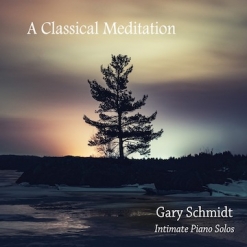
A Classical Meditation
Gary Schmidt
2020 / Gary Schmidt
63 minutes
Review by Kathy Parsons
Gary Schmidt’s A Classical Meditation is a collection of fifteen classical pieces that were composed over a period from the late 1600’s into the 2000’s - from JS Bach and Pachelbel through Philip Glass and Arvo Part. All but one of the pieces are arranged for solo piano; one includes synth strings. It’s a fascinating collection of both familiar and not-so-familiar classics that are on the quieter, more meditative side. Most listeners will be familiar with Beethoven’s “Moonlight Sonata,” Pachelbel’s “Canon in D” and Debussy’s “Claire de Lune,” so that will give you a point of reference for the overall feel of the album - thoughtful and expressive without a lot of flashy bravado. Gary Schmidt has done an excellent job of making a diverse group of pieces work together seamlessly, and his playing is flawless. Recorded on a Steinway grand piano, the piano sound is warm and rich.
A Classical Meditation begins with the Adagio movement from JS Bach’s Concerto in Dm. Played with warmth and poignance, it’s a lovely start! From Bach, we jump a few hundred years to Philip Glass’ “Etude #2,” a beautifully relaxed and flowing piece in Glass’ distinctive minimalist style. “Clair de Lune” is undoubtedly Claude Debussy’s most famous composition and is an iconic piece from the Impressionist movement. In Schmidt’s very capable hands, it sparkles and soothes. Eric Satie has two short pieces on the album, both from his “Pieces Froides, Danse de Travers,” #1 and #2. Not as well-known as his “Gymnopedies” and “Gnossiennes,” they are lovely examples of Satie’s simplicity and no-frills directness. Scriabin was a Russian composer in the later Romantic era, and his “Nocturne in Ab” combines a sweet melody with a flowing left hand, imbuing it with grace and gentle movement. Arvo Part is a contemporary Estonian composer of classical and religious music, and his “Fur Alina” is open and spacious. The second movement from Shostakovich’s Second Piano Concerto is soulful and melancholy. Synth strings add tonal color to this one. Chopin’s “Nocturne in C#m” is a piece published after his death (and one of my favorite nocturnes to play!). Deeply emotional and expressive, Schmidt does a beautiful job with it. I wasn’t familiar with Ravel’s “Concerto in G (second movement).” Slow, eloquent and played with heartfelt expression, it’s one of my favorites on the album. “Orfeu et Eurydice: Melodie” is a piano transcription by Ignaz Friedman (1882-1948) of a piece from the opera by Gluck. Slow and elegant with simmering passion, it’s another favorite. The second movement of Beethoven’s seventh symphony is dark and mysterious - possibly funereal - with a much lighter passage in the second half. A solo piano arrangement of Dvorak’s “New World Symphony (Largo)” overflows with hope and brings this excellent album to a peaceful close.
A Classical Meditation is available from apianist.com (Gary Schmidt’s website), Amazon, iTunes/Apple Music and CD Baby.
February 28, 2020

